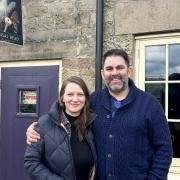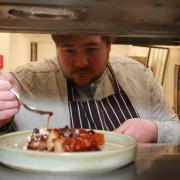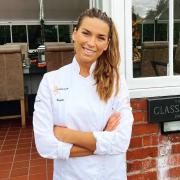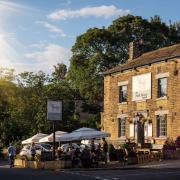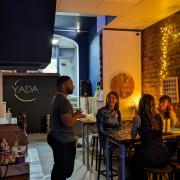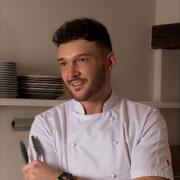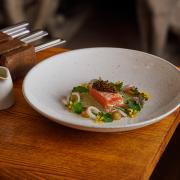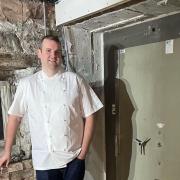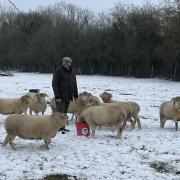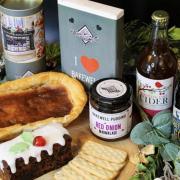It’s over ten years since Alison Swan Parente MBE founded the award-winning school that shines a light on the crafts of bread making, cheese making, brewing, charcuterie and patisserie. Pat Ashworth meets her at the Welbeck Estate near Worksop

It never occurred to Alison Swan Parente that she would do anything with food apart from cooking it and enjoying it. The woman who founded the Welbeck Bakehouse and the School of Artisan Food had a long and satisfying career as a psychotherapist in the NHS, working in the field of mental health services for children and adolescents. She retired at 60, reflecting soberly, 'You've probably seen enough of human unhappiness at that point.'
Her retirement came a few years after the family's move to Welbeck Abbey. Alison's husband, William, had inherited the 15,000-acre estate from his aunt, Lady Anne Bentinck, in 2008 and the good side of that, she remembers, was thinking, 'This is a very special place. What can I offer?' The other bit, she adds candidly, was, 'What am I going to do with myself here?'
She was born and brought up on the south coast and had what she describes as a very conventional Sussex upbringing. Her mother, a nurse, was a good frugal cook, typical of her generation but a lover also of Constance Spry and Elizabeth David, 'so there was quite a lot of what was seen to be exotic French cooking coming into it,' she remembers, adding, 'Though she did do the worst dinner party in Sussex when I was a child…
'It was grapefruit baked in the Aga, with a cherry on the top, and then for the second course, a tuna bake which was tinned tuna, Campbells condensed mushroom soup, spaghetti and a topping of potato crisps…' We fall about with laughter as I confess with shame to instantly recognising that dish and worse, continuing to make it myself. Summer Pudding was another of Alison's mother's favourites, made with the newly introduced sliced bread, 'terrible soggy bread but my parents' generation was entranced with it.'

Her first job after graduation and psychotherapy training was in America, where she shared a house with several others at the same stage of life. 'Everybody cooked. It was part of a common vernacular culture that was coming out of being a hippie, going back to the land, sustainability, all that kind of thing… Even the men cooked, which I thought was interesting - it showed that if you cooked, you didn't have to turn into your mother.' And she learned to make bread from a 'back to the land' book, The Tassajara Bread Book.
That's when she became interested in the fact that you could 'make bread, make cheese and cure things. And I married an Italian, and if you marry someone who is half Italian and want to make them happy, you cook for them.' When her son, Joe, opened the farm shop as one of the first family enterprises at Welbeck, she pondered what she might - 'at arm's length, so as not to be interfering…' - be able to contribute.
It turned out to be bread. 'The bread was awful,' she says frankly. 'This is only 11 years ago but it was hard to find any good bread - even in London, walking down Marylebone Lane, I saw they were importing sourdough bread from Belgium, bringing it in on the overnight boat. There were two very good artisan bakeries in the city but that was it.'
She pored over a book, Bread Matters by Andrew Whitley, 'a fantastic writer and a very good organic baker,' she says warmly. Fired with enthusiasm, she contacted him via his publisher and 'jumped into my car and drove up to Cumbria, where he had his bakery. We had a hysterically funny day talking about bread. He said, "You seem to be as mad as a dingbat but I'll come and help you with your bakery…"' Gareth Kennedy, a young man just starting out in the world of finance, joined them to explore the business side of how to start a bakery and the trio looked for the right building - which proved to be Welbeck's old fire engine block, previously used by the MOD when it had been based on the estate, and also known as the Lower Motor Yard, where visiting chauffeurs used to stay.

They identified a place that would be very good for a bakery but then pondered how they might use the rest of the substantial building. It would be very good to have a cheesemaker and a butcher there as well as a baker… 'And then we thought about fermentation and what things ferment… and was there anyone teaching these lost skills of artisan food in one place…?
'And we were right in the middle of the coalfields, and at that point, in an area where the indices of social deprivation are very high, so were levels of unemployment. And we thought, who do we teach? Do people want to be taught? These kinds of skills were very appropriate here in particular, where aspirations and routes to employment are complicated.'
So that was the ethos on which the trio based a funding application to the East Midlands Development Agency (EMDA), for a school of artisan food to teach local people and raise money for bursaries. The bid was very much focused on preserving dying skills. It so happened that on the very day it was submitted, Lehman Brothers crashed: a moment, says Alison, 'where everyone could see that the writing was on the wall for all kinds of things, including development agencies. Because things were going to have to change.
'We were incredibly lucky. They said, "If we give you a grant, you will have to do whatever you have to do in the space of three months." We said we could and we did - we got the money at the beginning of January 2009 and had to spend it by the 31st March.' They had the advantage of having already obtained the necessary permissions, and had put a Board together. And another piece of good fortune came their way. With a General Election in the offing, the influential BBC Radio 4 Food Programme, with Sheila Dillon, had to postpone a scheduled programme deemed to be too politically sensitive. They needed a replacement fast, and decided to feature the new School of Artisan Food.

'It went out in April and we were able to recruit,' Alison says with gratitude. 'We had no idea what we were doing at that stage. I was a psychotherapist, Andrew a baker and Gareth basically a student. But we made an exceptional team. Our application to EMDA is still the lodestone of what we are doing. It was really our moral position: its outputs were employment, and we have always doubled that.'
They planned for a one-year diploma in breadmaking, one in cheesemaking and one in butchery, but started with short courses until all that could be put into place. The School attracted the best teachers - 'If you build a facility that has a good infrastructure, people will come to you… And you read about people and think, "I wonder if they'd come and teach here,"' Alison says with pleasure. There was Val Bines, for example, acknowledged to be Britain's best cheese maker, who came initially to teach the short courses and became the tutor for the one-year diploma. Other key tutors include Andrew Sharp, Wayne Caddy, Emanuel Hadjiandreou, Chris Moorby, Valentina Harris and Lindy Wildsmith.
Accolades have been heaped on the School: its annual Food for Thought Festival attracts food writers, business owners and educators as lecturers; a Cookery School of the Year award came in 2014/15, and the Countryside Alliance Clarissa Dixon Wright Award in 2017 for outstanding contribution to food and education. This month sees the first students to take a new foundation course, the FdSc, in partnership with Nottingham Trent University and taught jointly by both institutions - a huge feather in the School's cap.
I'm privileged to tour the building, from the library with books galore to the teaching rooms with their big, scrubbed tables. And whilst I'm utterly fascinated and irresistibly drawn to the purposeful processes of fermented bread making - the active leaven that smells wonderfully of beer, the tactile nature of the sourdough at its various stages of production - it's the students we encounter who demonstrate what this place is all about.
They're young. Serious. Dedicated. Local. Entrepreneurial - many ex-students from here are running their own artisan bakeries and food businesses. They're not from privileged backgrounds. The School partners with all manner of organisations: places like the nearby Rhubarb Farm, for example, an organic farm which offers placements, training and volunteer opportunities to anyone from ex-offenders to people with learning difficulties or pupils having trouble at school.
And the proudest thing that Alison points out on our tour is a map of the world showing all the countries from which refugees have come. In conjunction with the Nottingham and Notts Refugee Forum, every cohort includes one refugee, and the current holder, from Iraq, is described as an 'absolute star'.
'The thread that runs through all this is that we are a charitable trust and so a lot of our work is to do with our charitable remit,' Alison points out. 'We raise money for bursaries - two of the students in our current cohort are paid for entirely by two local people, for instance.' It hasn't all been easy, of course. Luck has come into it sometimes; she acknowledges the 'extraordinary resources and advantages' that she has at Welbeck; she pays warm tribute too to all the 'good people' with whom she feels privileged to work.
We talk of the future: climate change and food supply chains; resources, the poverty that makes people eat badly; the care that must be taken 'not to be producing niche products for the middle classes that no-one else can afford to buy. I'm pretty interested in how people can eat well in a very unjust society, and hope that equality can be spread about a bit more'. She is on the board of Sustain The Campaign for Better Food and Farming, and reflects, 'You have to think politically around what food people are eating.'
Her passion and enthusiasm are infectious. We drop in at Welbeck's micro-brewery, which supplies up to 20,000 pints a week to 300 outlets and makes beer from everything imaginable - from rhubarb to blackberries, from nettles to coffee grounds, from the cocoa shells redundant after chocolate making to the whey from the cheese making process. Nothing is wasted here on an estate where rural and creative industries come together.
She has an MBE for dedication to charity and education, and William a CBE for service to the arts and philanthropy. It's a combination that sums up the estate, really, in its latest incarnation as both a family home and a working community. Above all, she feels 'very lucky still to be working and to be surrounded by younger people. There are things we can do that our age and experience adds to rather than taking away.'
For details of courses visit schoolofartisanfood.org






